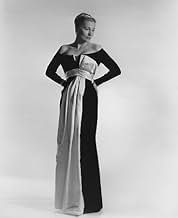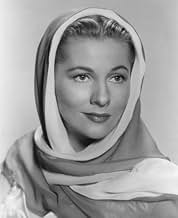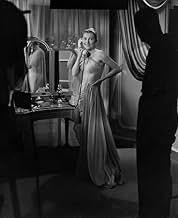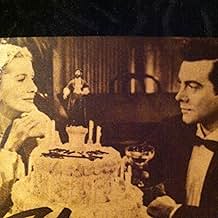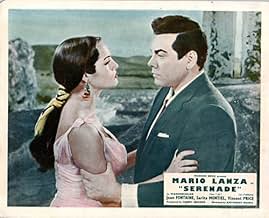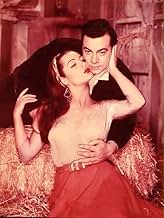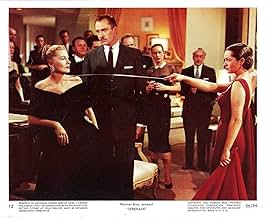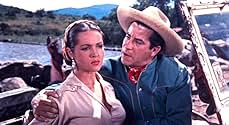Damon Vincenti, a young vineyard worker, has a beautiful tenor voice and dreams of becoming a great opera singer. He debuts at Lardelli's Italian restaurant in San Francisco, where he is spo... Read allDamon Vincenti, a young vineyard worker, has a beautiful tenor voice and dreams of becoming a great opera singer. He debuts at Lardelli's Italian restaurant in San Francisco, where he is spotted by Kendall Hale, a society girl who enjoys launching young artists while making them ... Read allDamon Vincenti, a young vineyard worker, has a beautiful tenor voice and dreams of becoming a great opera singer. He debuts at Lardelli's Italian restaurant in San Francisco, where he is spotted by Kendall Hale, a society girl who enjoys launching young artists while making them her lovers before dumping them after use. Damon is no exception to the rule: he becomes fa... Read all
- Juana Montes
- (as Sarita Montiel)
- Accident Witness
- (uncredited)
- American Woman
- (uncredited)
- Opera Attendee
- (uncredited)
- Iago in 'Otello'
- (uncredited)
- Russell Hanson
- (uncredited)
- Shepherd Boy in 'L'Arlesiana'
- (uncredited)
Featured reviews
Sarita, though her list of Spanish language films is quite awesome, never enjoyed much of a career in Hollywood films. (We weren't nearly as accepting of non-Anglo leading ladies back then.) She is just gorgeous in this one and her playing as the fiery and passionate (what else?!?) Juana helped Mario convince us that he was a man who could be snatched from the diabolical and devastating ensnarements of Joan Fontaine's spoiled heiress, Kendall Hale. The introduction of her character, when Mario flees in disgrace to Mexico, permits a scenic and worth-the-price-of-admission tour of Mexican locales.
The music is fairly well presented in this one. Not being an opera connoisseur, I am not qualified to comment knowledgeably on Mr. Lanza's renditions of operatic excerpts, but I have always found his tenor voice to be among the most listenable (So many of them just bleat!), and his constant reprising of the title song throughout this movie did not grow tiresome, at least to these ears.
A side note: Mario's father, quite a dear old gentleman, who had remarried, lived down the street in the Huntington Palisades section of Pacific Palisades, in southern California, where my family owned a home. I frequently saw Mario's Cadillac parked in his father's driveway, but, alas!, never caught a glimpse of the golden-voiced Mario himself, who was, you may be sure, his father's pride and joy.
Let's get the quibbles out of the way first. Injudicious editing has made some of the scenes appear silly and illogical. The speed with which Lanza becomes obsessed with Joan Fontaine seems absurd, and the ending could have been so much better. Would that the scenarists had had the courage to follow more closely the James Cain novel on which this movie is based, but then again, this was Hollywood, 1955. Had the movie been made without the censorship constraints of, say, a mere ten years later, it could have been a masterpiece. All I can say is, read the novel and you'll see what I mean!
I would also criticize Anthony Mann's direction at times. Re-takes of some of Lanza's hammier moments should definitely have been made, and the film lacks (at times) the full dramatic treatment that its subject deserves. Re-takes of Lanza's Nessun Dorma and Di Quella Pira should also have been made. In both arias he sounds uncharacteristically strained, and in each case a second take would have sorted out the problem.
Quibbles aside, Lanza's acting is often outstanding (the Ave Maria scene, for instance, is a revelation). Vincent Price, Lanza's acid-tongued and hilarious manager in the movie, later remarked off-screen how impressed he was with the tenor's dedicated approach to his acting. Sarita Montiel is also outstanding in her role as a fiery Mexican bullfighter's daughter, providing Lanza with his best-ever leading lady.
But what makes this film a vocal masterpiece is Lanza's singing. La Danza, Torna a Surriento, Amor Ti Vieta, O Paradiso, the Otello Monologue (Dio! Mi potevi scagliar...) and the heart-rending Lamento Di Federico are all astonishing feats of singing. By 1955 Lanza's voice had darkened into a lirico spinto tenor that often borders on the dramatic. It is rare indeed to hear a tenor with such baritonal fullness AND a ringing tenorial top. (Eat your heart out, Placido Domingo!) Lanza For my money, the Otello Monologue is the pinnacle of Lanza's operatic legacy, and the finest recording of this aria. The scene in which it appears is also brilliantly acted by Lanza. As the critic John Cargher would later remark, Lanza's rendition of the Otello Monologue alone "would assure him of immortality."
All criticism aside, Serenade remains a source of immense pleasure to me, and it is richly deserving of far wider appreciation.
The story line is good and the acting okay. I found it thoroughly engaging and who could refuse to like this film when Vincent Price is in it. What a class act he is. Voice, presence, poise - this actor had it all. We will never hear a voice like Lanza again. The tenors of today are technically good but they have no heart, soul and emotion although they try very hard. My eyes are moist whenever Lanza sings it is so beautiful. What a joy to hear him sing. "And Flights of Angels Sing Thee to Thy Rest"!
Anyway, the screenplay here is so predictable that it seems written on autopilot and one is hard-pressed to believe that it was based on a novel penned by hard-boiled noir writer James M. Cain; it comes as no surprise, then, to learn that the film version was heavily bowdlerized! Incidentally, Cain was also behind similar musical soap opera stuff like WHEN TOMORROW COMES (1939) and its remake INTERLUDE (1957) that had equally boasted the services of notable directors (John M. Stahl and Douglas Sirk, respectively) for their transition to the screen! On a personal note, it is unfortunate that, while respected Maltese character actor Joseph Calleia got to work with two of Hollywood's most talented film-makers of that time within the same year, it was only on their least interesting movies: this and Nicholas Ray's HOT BLOOD!; what is even worse is that another Maltese who goes by the name of Joseph Calleia is currently enjoying worldwide fame as a tenor himself - thus endangering his earlier namesake (who died back in 1975)'s own fledgling reputation on his home ground!
The supporting cast of SERENADE is quite good actually: Joan Fontaine (she has the right looks for the role of the bitchy society dame who entraps Lanza in her tangled web but there is next to no chemistry between them!), Sarita Montiel (Mann's wife at the time, she has the role of Lanza's beautiful Mexican redeemer), Vincent Price (a breath of fresh air as the witty, artless impresario), Silvio Minciotti (as Lanza's first restaurateur employer), Vince Edwards (as Fontaine's temperamental prize-fighting pet) and Edward Platt (as the director of Lanza's ill-fated stage debut performance of "Othello" – which he hysterically abandons in mid-aria simply because Fontaine has not turned up to see him!). Similarly histrionic moments occur during a thunderstorm in the Mexican plains (almost evoking John Ford's THE QUIET MAN {1952}!) and when a jealous Montiel (incidentally, she has her own jilted lover to contend with!) loses it by bullfighting a mocking Fontaine at a society party that precipitates an unbelievably contrived climactic traffic accident (with an inevitable happy outcome just as Lanza is about to go live on the airwaves)! To counter such melodramatic (if appropriately operatic) outbursts, perhaps the film's best sequence is the simple and moving one in which Lanza and Montiel enter a Mexican church to pray, and it is here that he regains his self-confidence (having spent some time on the skids and then returned to his roots as a field-worker!) by singing Schubert's "Ave Maria".
Apart from the afore-mentioned "Othello", the film also shows Lanza performing a famous aria from Giuseppe Verdi's "Il Trovatore" (incidentally, I have just acquired Renato Castellani's 10½-hour biopic of the famed Italian composer shot in 1982 for Italian TV with Ronald Pickup in the lead!), as well as 2 new songs in English (one of them 'composed' and played on the piano by Vincent Price and the title tune, which is reprised for the finale). Having mentioned the English numbers just now, it is odd given his proud heritage that, when Lanza is about to leave home early on in search of success (managed by his cousin Harry Bellaver), he treats his paisani to a pop tune – and in a foreign tongue, to boot! By the way, this viewing came via a TCM U.K. broadcast of the Warner Bros. production (albeit screened full-frame).
Did you know
- TriviaWarner Brothers bought the screen rights to the book in February 1944 and over the next 10 years various people were associated with it. At one point Ann Sheridan and Dennis Morgan were set to co-star and later Michael Curtiz was set to direct.
- Quotes
Damon Vincenti: Hey! Are you hiring a singer or a bookkeeper?
Lardelli: Oho, he IS a tenor!
- ConnectionsReferenced in Apprenticing a Master - Neil Sinyard on the Tin Star (2024)
- SoundtracksNessun dorma
(uncredited)
from "Turandot"
Music by Giacomo Puccini
Libretto by Giuseppe Adami and Renato Simoni
Performed by Mario Lanza
Everything New on HBO Max in June
Everything New on HBO Max in June
- How long is Serenade?Powered by Alexa
Details
- Runtime2 hours 1 minute
- Aspect ratio
- 1.85 : 1
Contribute to this page



